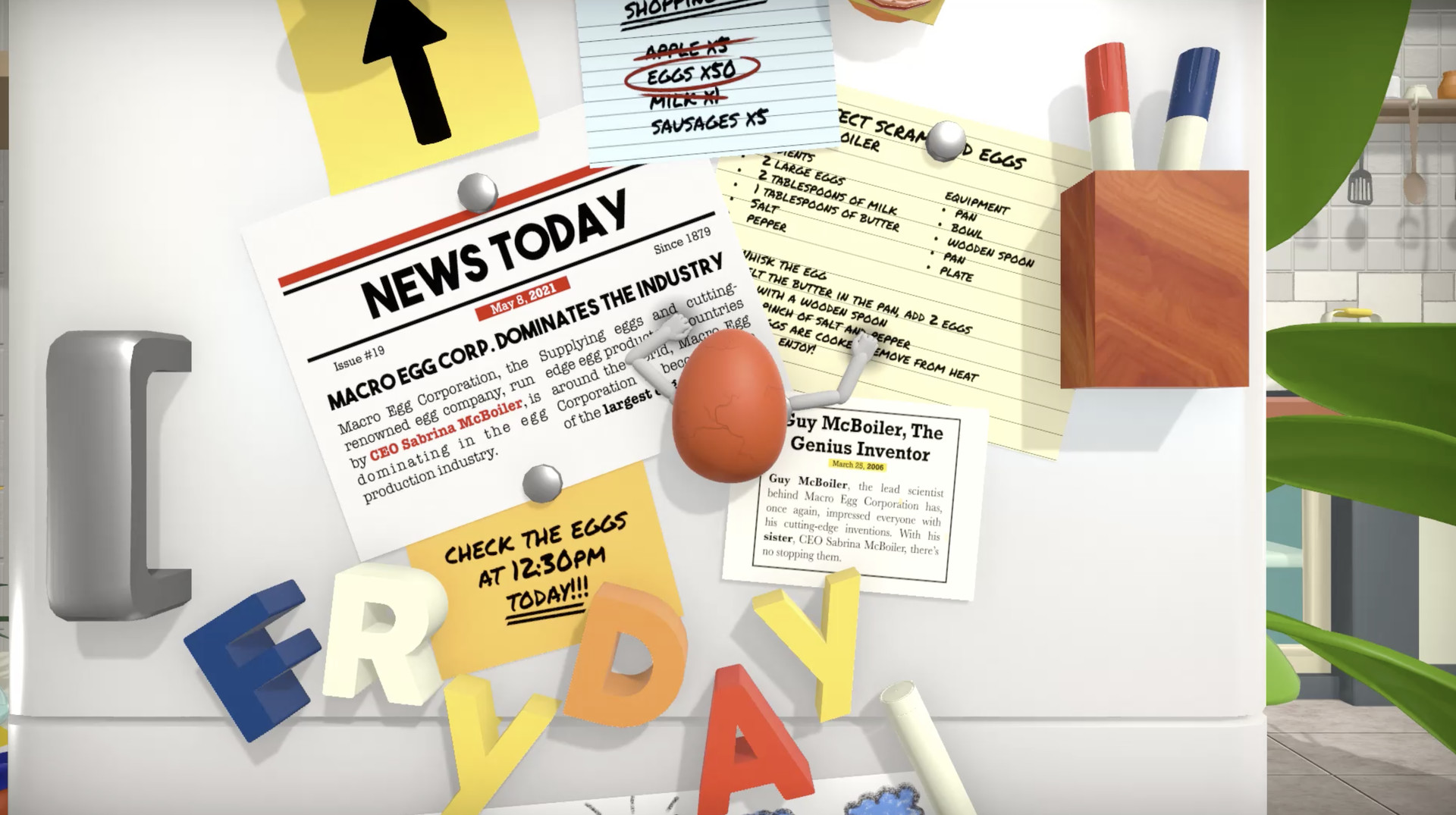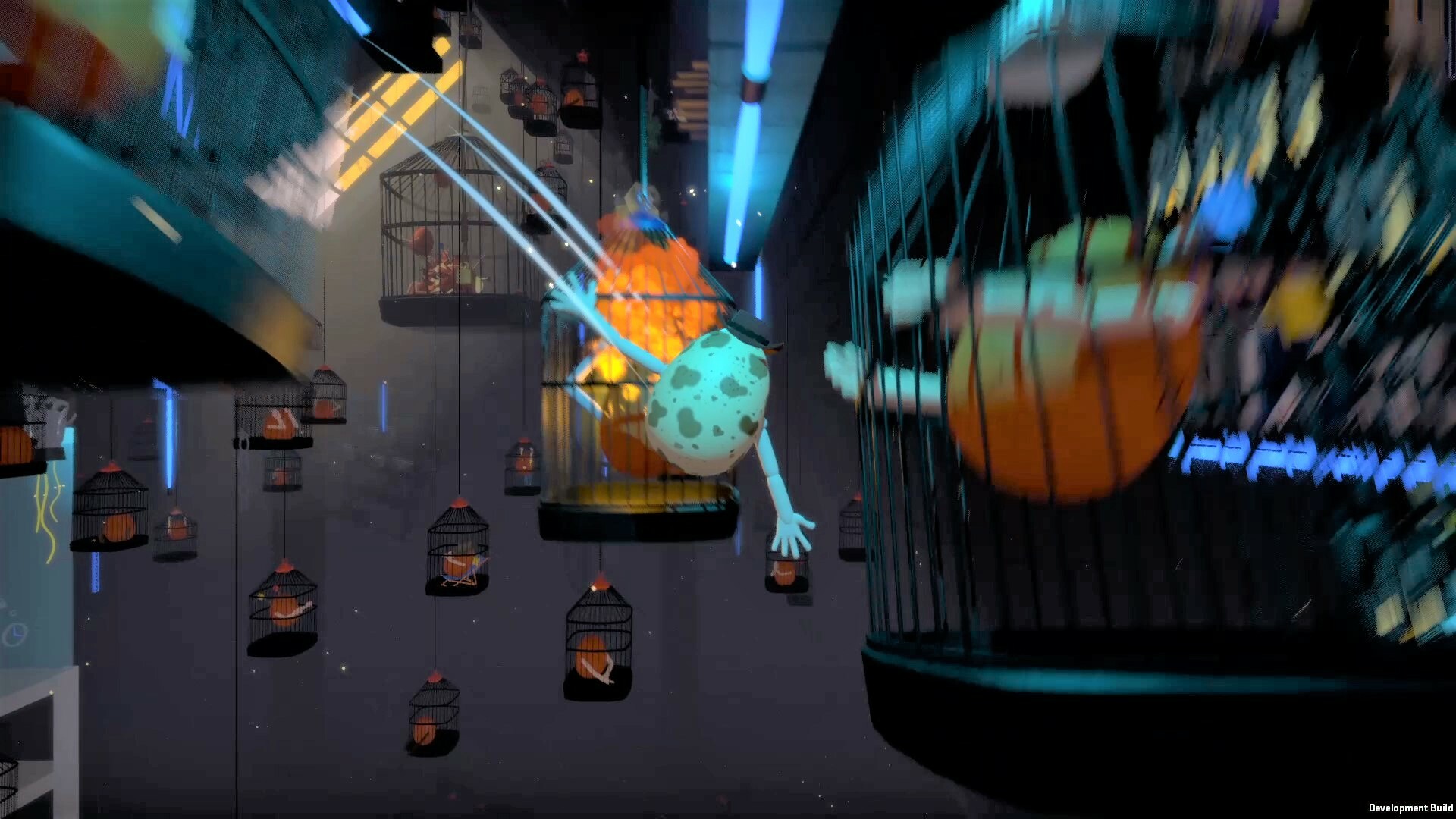Yolked
•
Illustration by Enid Smith
For weeks, Hazel Wong, ’20, had been imagining what it would be like to present her team’s video game, Yolked, at their class’ game exhibition.
In the game, players control an egg and try to escape a kitchen by pulling the egg along with two cartoonish arms. It was built as a project for EECS 494, an introduction to video game development class in the computer science program. The course usually concludes with a showcase event at the Bob and Betty Beyster Building on U-M’s North Campus, where classmates pick up controllers and try navigating the digital worlds they had coded.
But in March 2020, instead of finishing the game and preparing for the big event, Wong was on a long flight to Hong Kong, returning home to her family amidst the uncertainty of the early days of the COVID-19 pandemic.
Traveling into a time zone 13 hours away from her teammates, Wong says she realized that if her team was going to still make their game, they would have to find a way to adapt.
“I think the hardest part was that when the pandemic hit, I actually had to fly back to Hong Kong, so there was that extra thing where we had to coordinate our schedules and the time zones were a 12-, 13-hour difference,” Wong says. “So it was really difficult for us to work together. There were many nights when we had to stay up past 3:00 a.m. just to work on the game together, but it was fun and it worked out.”
Professor Austin Yarger, ’15, MSE’18, moved the class lectures to Twitch, a popular video game live-streaming platform. He announced the showcase would also be on Twitch and students would be able to use Discord, a text, voice, and video chat platform, to communicate.
Wong says she was disappointed when she first heard about the decision.
“I think everybody who does [computer science] knows about the showcase because it’s in the main building where all the [computer science] classes are,” she says. “People just come around to play video games and it’s this fun event. I was also really excited to play other people’s video games in person. But then, all of a sudden, we couldn’t do that anymore.”
The team chatted digitally, video conferenced at odd hours, and decided to alter the concept of their game to fit the new showcase platform. Though initially planned to be a two-versus-two contest, they pivoted to a single-player experience that would be humorous for Twitch spectators.
Yarger said that taking the showcase online meant the event would be far more accessible to communities beyond campus.
“Before, we were able to get 200 to 300 people to attend the showcase. Now that we’re holding our events online, we’re getting about over 1,000,” Yarger said. “Alumni, recruiters from companies, and friends of the University are all able to attend because suddenly, the showcase is no longer thousands of miles away, it’s just a link away.”

During the first-ever virtual showcase on Twitch, spectators watched as the Yolked egg protagonist slowly climbed up countertops and along a refrigerator covered in alphabet magnets, sticky notes, and newspaper clippings with egg-related headlines. Cracking as the pressure of the situation escalated, the egg held on to dear life as it dodged a spatula swatting at it and dangled over an ominous thumbtack-covered floor.
Meanwhile, on Discord, observers typed in gifs, emojis, and comments of praise every few seconds throughout the entire demo. By the time it was over, Yarger announced that Yolked had won first place.

Remote Learnings
Over the course of the game’s development, Wong says team members — herself, Baha Okten, ’20, Floney Yang, ’21, and Dan Zakon, ’21, as developers; artists Jack Yang, ’20, MSE’21, and Eli Lustig, ’21; and marketing manager Colleen Tacubao, ’20 — often spent upwards of seven hours per week meeting on Discord to continue enhancing Yolked based on player feedback. Each of the collaborators were in different cities.
“Remote meeting is more convenient because of time differences and I think it’s really easy for us to show our progress as well, because we can just share our screen and show what we’re working on. We have all our meetings online. I haven’t even ever met two of the members of the team in person,” Wong said.
Following their showcase win in April 2020, Wong, Okten, and Floney Yang founded Hardboiled Studios and signed a publishing deal to finish developing Yolked, while Jack Yang and Zakon pursued other commitments. Lustig joined Hardboiled as a 3D artist in August 2020, and Tacubao joined as marketing manager in June 2021. As of publication, Yolked is in Early Access on the Steam digital storefront, which allows players to purchase the game while Hardboiled continues to work heavily on it. The team is preparing for a full release in February 2023.
In addition to bringing about an unprecedented learning experience for his students, Yarger said the pandemic was a teachable moment for the entire video game industry.
“Many game developers have discovered that the problems introduced by remote working are short-term problems, not persistent long-term ones,” Yarger said. “Many teams are deciding to fully realize the benefits of having a remote team, minimizing their office space, and as a result, gaining access to talent all over the globe.”
Yarger said the pandemic has also shown aspiring game developers that they have options beyond relocating for in-office jobs in the traditional coastal hubs of video game development. He built a central website that displays information and links to all of the video game studios that conduct work in the state of Michigan. Michigangamestudios.com currently lists over 100 companies. Additionally, WolverineSoft, a game-development-focused student organization, runs a Discord server that serves as an active forum for 1,500 U-M community members, including students and alumni.
Yarger said the pandemic provided an opportunity for people to embark on immersive experiences, including Everest VR in which users put on a virtual reality headset and walk through high-definition, 360-degree footage captured on an authentic climb up the world’s tallest mountain. After trying this himself, Yarger said he has pondered possibilities for virtual reality to conceivably encourage empathy and connectedness through virtual first-responder trainings and bias simulations — a concept he now explores in his new senior capstone course “Extended Reality and Society,” offered at U-M for the first time in the Fall 2022 semester.
Connecting Through Games
Online games proved to be a viable virtual meeting space throughout the pandemic’s isolation.
“We had a solid two years where if you wanted to hang out with your friends, it didn’t really matter if you had played video games before in your life,” Yarger said. “You were downloading a game because that’s where all of your friends were, and you were downloading Discord.”
One alum of the video game class, Michael Siciliano, ’18, works as a software engineer at Jackbox Games. The company’s “Party Pack” series was an extremely popular pandemic social activity that reported a remarkable growth from 100 million players in 2019 to 200 million in 2020, with 110 million users logging on between March and June 2020 alone.
Siciliano attributes such popularity to the affordable and accessible nature of the “Party Pack” model. Jackbox Games releases a new pack containing five games every autumn and only one person needs to purchase a pack that costs $30 or less for a group of friends to easily play together in a private game room.
Inside the virtual room, players answer prompts on their devices and these actions influence what all players see on a shared game screen. For example, in Fibbage, players are asked to anonymously enter a false but plausible answer to a question on the screen. Then, every player votes on which answer they think is correct and anyone who gets people to vote for their misleading answer earns points.
Siciliano said that while many players were first exposed to “Party Packs” before the pandemic by playing in the same physical space together in front of one television, people have increasingly streamed the shared game screen over Zoom or Discord so that friends can view the same images, hear the same comical narration, and converse and react with each other anywhere around the world.
He said the bump in revenue from the surge of pandemic players helped the company grow its staff from approximately 45 to 75 employees, which helped increase the bandwidth of their small teams of eight people per game who build the “Party Pack” throughout an entire year. He said games have become increasingly tested for virtual audiences as opposed to in-person parties though they are still tested for both configurations.
Siciliano said video game development class and the showcase changed the trajectory of his life by showing him that making games was a real option if he worked hard. After graduating in December 2018, he applied to 81 game development companies before accepting an offer from Jackbox where he had interned the previous summer.
He said he landed that internship because the hiring managers were able to play a project he created in EECS 494: an internet-based recreation of the first dungeon of the 1986 Nintendo title The Legend of Zelda, built using the modern Unity game engine.
“In my application materials, there was a link to a file that they could download, and they could play an actual game that I had made,” he said. “That first step was huge.”
Steve Zoski, ’13, is a freelance writer based in Dearborn, Michigan.



